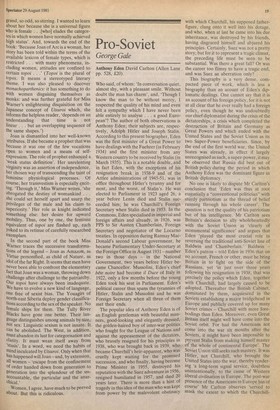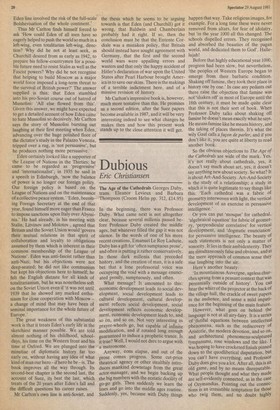Pro-Soviet
George Gale
Anthony Eden David Carlton (Allen Lane pp. 528, £20).
Who said, of whom: 'In conversation quiet, almost shy, with a pleasant smile. Without doubt the man has charm', and, 'Though I know the man to be without mercy, I respected the quality of his mind and even felt a sympathy which I have never been able entirely to analyse . . . a good European'? The author of both observations is Anthony Eden; their subjects are, respectively, Adolph Hitler and Joseph Stalin. According to this present biographer, Eden was the first minister of a Great Power to have dealings with the Fuehrer (in February 1934) and the first minister from any Western country to be received by Stalin (in March 1935). This is a notable double, and in fact Eden, with the exceptions of his resignation break in 1938-9 and of the Attlee administrations of 1945-51, was in office throughout Hitler's tyranny and for most, and the worst, of Stalin's. He was elected to Parliament in 1923 aged 26, a year before Lenin died and Stalin succeeded him; he was Churchill's Foreign Secretary when Stalin died in 1953. In the Commons, Eden specialised in imperial and foreign affairs and already, in 1926, was PPS to Sir Austen Chamberlain, Foreign Secretary and negotiator of the Locarno treaties. In opposition during Ramsay MacDonald's second Labour government, he became Parliamentary Under-Secretary at the Foreign Office in August 1931— number two in those days — in the National Government, two years before Hitler became Chancellor. Mussolini, Eden's chief bete noire had become il Duce of Italy in 1922, only a few months before the young Eden took his seat in Parliament. Eden's political career thus spans the tyrannies of Hitler, Stalin and Mussolini and he was Foreign Secretary when all three of them met their ends.
The popular idea of Anthony Eden is of an English gentleman with beautiful manners, good-looking and elegantly dressed, the golden-haired boy of inter-war politics who fought for the League of Nations and against the appeasement of the dictators, who bravely resigned for his principles in 1938, who was brought back in 1939, who became Churchill's heir-apparent, who was cruelly kept waiting for the promised succession, and who finally, having become Prime Minister in 1955, destroyed his reputation with the Suez adventure in 1956, resigned humiliated in 1957, and died 20 years later. There is more than a hint of tragedy in this idea of the man who was kept from power by the malevolent obstinacy with which Churchill, his supposed fatherfigure, clung onto it well into his dotage, and who, when at last he came into his due inheritance, was destroyed by his friends, having disgraced himself and abjured his principles. Certainly, Suez was not a pretty story; but for it to represent a tragic climax, the preceding life must be seen to be substantial. Was there a great fall? Or was the career too flimsy to have a tragic end, and was Suez an aberration only?
This biography is a very dense, compacted piece of work, which is less a biography than an acount of Eden's diplomatic dealings. One cannot say that it is an account of his foreign policy, for it is not at all clear that he ever really had a foreign policy, even though he was undoubtedly our chief diplomatist during the crisis of the dictatorships, a crisis which completed the destruction of Britain and Germany as Great Powers and which ended with the United States and the Soviet Union as its two Super-Power beneficiaries. Since, by the end of the first world war, the United States was already, in effect if largely unrecognised as such, a super-power, it may be observed that Russia did best out of British policy during the period in which Anthony Eden was the dominant figure in British diplomacy.
No one is likely to dispute Mn Carlton's conclusion that 'Eden was thus at root essentially a "conventional politician" with sturdy partriotism as the thread of belief running through his whole career'. The question is not the quality of his patriotism but of his intelligence. Mr Carlton sees Britain's decision to ally wholeheartedly with the Soviet Union as 'clearly of monumental significance' and argues that Eden 'played the most crucial role in reversing the traditional anti-Soviet line of Baldwin and Chamberlain.' Baldwin — Eden's patron — told Eden in 1936 that on no account, French or other, must he bring Britain in to fight on the side of the Russians, yet 'in just over three years following his resignation in 1938, that was precisely the policy which Eden, together with Churchill, had largely caused to be adopted. Thereafter the British Cabinet, dominated by them, acquiesced in the Soviets establishing a major bridgehead in Europe and publicly covered up for many Soviet crimes — Churchill with more forebodings than Eden. Moreover, even Great Britain itself might well have come into the Soviet orbit. For had the Americans not come into the war six months after the Soviets, it might have been impossible to prevent Stalin from making himself master of the whole of continental Europe'. The Soviet Union still seeks such mastery. It was Hitler, not Churchill, who brought the United States into the war, thereby rendering 'a long-term signal service, doubtless unintentionally, to the cause of Western liberal civilisation in Europe. The post-war presence of the Americans in Europe has of course' Mr Carlton observes 'served to mask the extent to which the Churchill Eden line involved the risk of the full-scale Bolshevisation of the whole continent.'
Thus Mr Canton finds himself forced to ask 'How could Eden of all men have so eagerly helped to push the world so much in a left-wing, even totalitarian left-wing, direction? Why did he not at least seek, as Churchill desired from as early as 1942, to prepare his fellow-countrymen for a possible future need to resist Stalin as well as the Fascist powers? Why did he not recognise that helping to build Moscow as a major world force imposed a long-term threat to the survival of British power?' The answer supplied is thin: that Eden stumbled into his pro-Soviet course out of hatred of Mussolini: 'All else flowed from this'. Given this answer, we might have expected to get a detailed account of how Eden came to hate Mussolini so decisively. Mr Carlton says the story of Mussolini bursting out laughing at their first meeting when Eden, advancing over the huge polished floor of the dictator's study in the Palazzo Venezia, tripped over a rug, is 'not persuasive', but he produces nothing more persuasive.
Eden certainly looked like a supporter of the League of Nations in the Thirties; he came to be regarded as 'progressive' and Internationalist'; in 1935 he said in a speech in Edinburgh, 'now the balance of power is no longer our foreign policy. Our foreign policy is based on the League of Nations and on the maintenance of a collective peace system. "Eden , becoming Foreign Secretary at the end of that year, found himself more eager than France to impose sanctions upon Italy over Abyssinia.' He had already, in his meeting with Stalin, Litvinov and Molotov , agreed that Britain and the Soviet Union would 'govern their mutual relations in that spirit of collaboration and loyalty to obligations assumed by them which is inherent in their common membership of the League of Nations'. Eden was anti-fascist rather than anti-Nazi; but his objections were not deep-seated; he did not like communism but kept his objections here to himself; he felt the English distaste for all kinds of totalitarianism, but he was nonetheless soft on the Soviet Union even if it was not until 1939 that he showed any marked enthusiasm for close cooperation with Moscow — a change of mind that may have been of seminal importance for the whole future of Europe.'
The great weakness of this substantial work is that it treats Eden's early life in the sketchiest manner possible. We are told almost nothing of his childhood, schooldays, his time on the Western front and his time at Oxford. We are plunged into the minutiae of diplomatic history far too early on, without having any idea of what kind of man our hero — if hero he be — is. The book improves all the way through. Its second-best chapter is the second last, the account of Suez, its best the last, which treats of the 20 years after Eden's fall and the difficult questions his career raises.
Mr Canton's own line is anti-Soviet, and the thesis which he seems to be arguing towards is that Eden (and Churchill) got it wrong, that Baldwin and Chamberlain probably had it right. If so, then the conclusion must be that the Entente Cordiale was a mistaken policy, that Britain should instead have sought agreement with Germany, that the first and the second world wars were appalling errors and wasters and that only the happy accident of Hitler's declaration of war upon the United States after Pearl Harbour brought America in to save our skins. There is the makings of a terrible indictment here, and of a massive revision of history.
Mr Carlton's impressive book is, however, much more tentative than this. He promises us a second edition, after the Suez papers become available in 1987, and it will be very interesting indeed to see what changes he makes then and how this present work stands up to the close attention it will get.



































 Previous page
Previous page